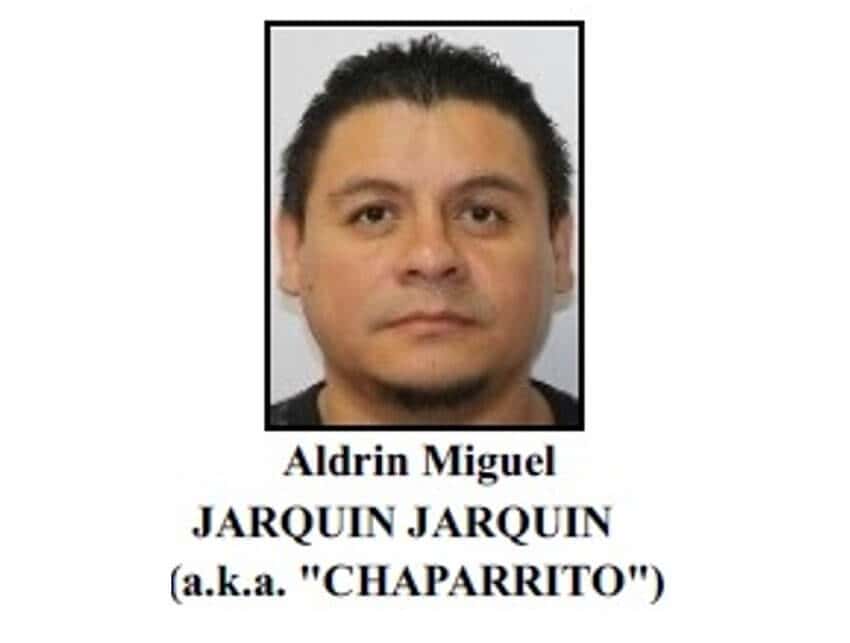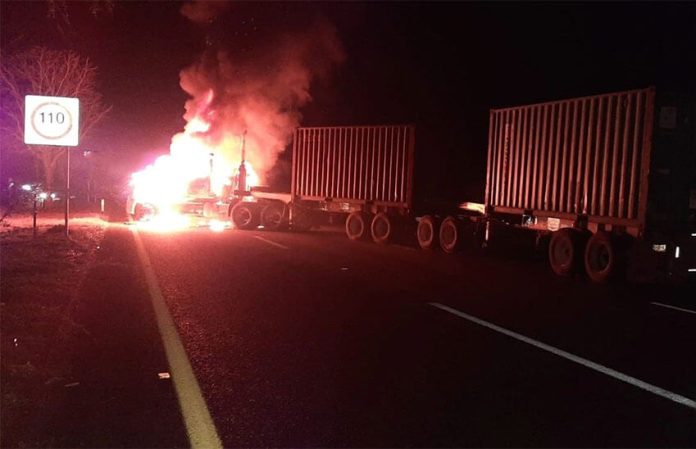At least four narco-blockades were reported on Sunday night and Monday morning in highways surrounding Colima city and Cuauhtémoc municipality hours after the arrest of the suspected regional leader of the Jalisco New Generation Cartel (CJNG).
Motorists reported that trucks and trailers were set on fire around 10:30 p.m. on Sunday blocking roads in El Trapiche, about five kilometers northeast of Colima city, near the Colima-Guadalajara highway, and by a nearby gas station on the highway. Another burning vehicle obstructed motorists on the same road further inside Colima city.
The highways division of the National Guard maintained that the road closures were due to accidents. They confirmed that the roads reopened and were operating normally by 3 a.m on Monday.
Aldrin Miguel Jarquín Jarquín, 45, known by the moniker “El Chaparrito” (Shorty), was arrested on Sunday in Zapopan, Jalisco, by federal forces.
Mexican and U.S. authorities suspect Jarquín of running the CJNG’s operations — trafficking drugs and importing weapons — in Manzanillo, Colima, home to Mexico’s largest port. They believe Jarquín to be outranked only by the leader of the CJNG, Nemesio “El Mencho” Oseguera Cervantes, and El Mencho’s son-in-law Julio Alberto Castillo Rodríguez.

In October 2021 Jarquín was put on a black list by the U.S. Treasury Department along with his brother, José de Jesús Jarquín Jarquín, César Enrique Díaz De León Sauceda and Fernando Zagal Antón. In June, 2020 Mexico’s Financial Intelligence Unit (FIU) blocked the four men’s bank accounts due to their links to the CJNG.
According to the U.S. Drug Enforcement Administration (DEA), the four suspected criminals are among the highest-ranking members of the cartel.
“They help coordinate the CJNG’s drug trafficking operations through the port of Manzanillo and maintain contact with cocaine supply sources in Colombia,” reads an indictment by the U.S. Office of Foreign Assets Control (OFAC).
Colima is the smallest state in the country by population, home to just over 730,000 citizens. However, its modest size and remote location haven’t spared it from becoming one of the most violent places in Mexico: 84 people were killed from February 7 to March 7, almost three per day.
The University of Colima suspended its classes and citizens implemented an informal curfew due to the wave of violence which started with a prison riot on January 25 in which nine inmates were killed. The violence spread to the streets on February 7 in a territorial battle between the CJNG and the local gang Los Mezcales, a previous ally that switched allegiance to the Sinaloa Cartel.
More than 10 bags with human remains were found in that month-long period; 25 narcomantas (banners used by criminals to issue threats) were seen in the state and 30 people were injured in crossfire while in their homes and vehicles, the newspaper Milenio reported. The state Attorney General’s Office also reported an increase in extortion and theft in the state which was once best known for its active volcano.
The period that began February 7 has been one of the most violent in Colima’s history with 10.4 murders per 100,000 inhabitants. It’s the most killing the state has seen since December 2017, when authorities reported a monthly homicide rate of 12.8 per 100,000 inhabitants.
Colima was Mexico’s most violent state on a per capita basis for five consecutive years between 2016 and 2020, before losing that unenviable title to Zacatecas last year.
President López Obrador visited Colima city on February 25 in a show of support for Morena party Governor Indira Vizcaíno Silva, who interrupted 72 years of Institutional Revolutionary Party (PRI) power in the state by winning the June 2021 elections.
In mid-February, the government announced a deployment of 2,000 federal security forces to Colima, who now number 6,000 across 10 municipalities.
